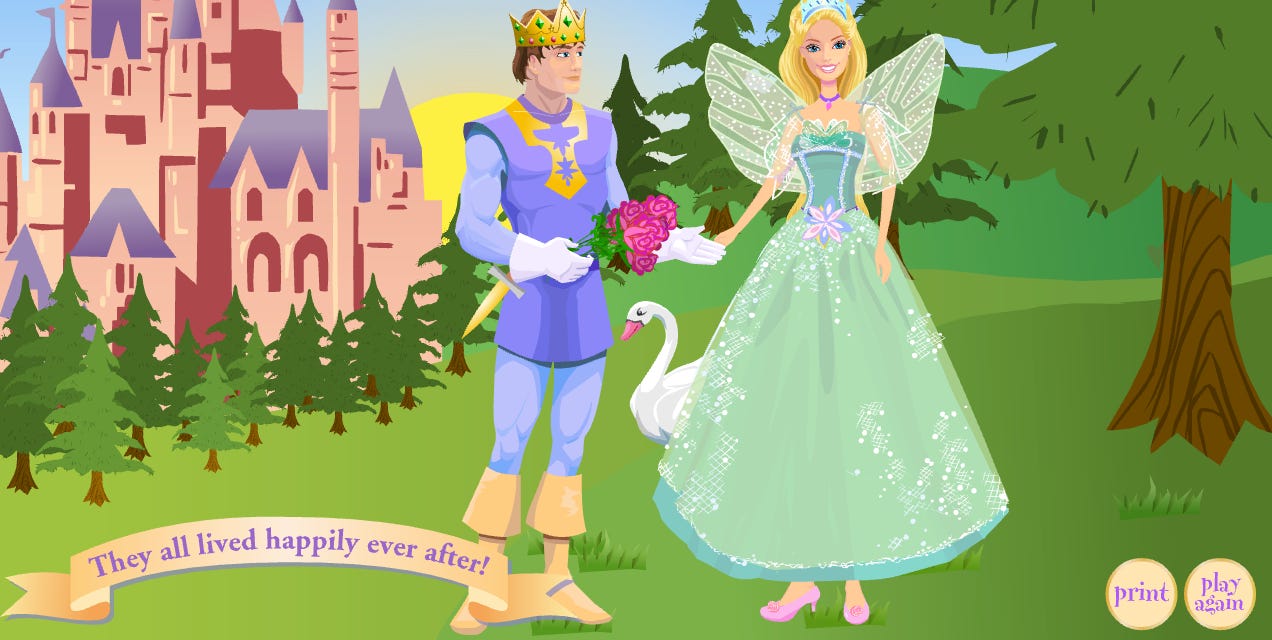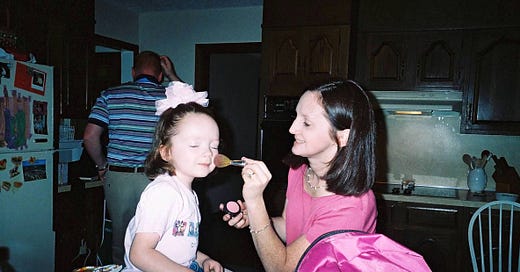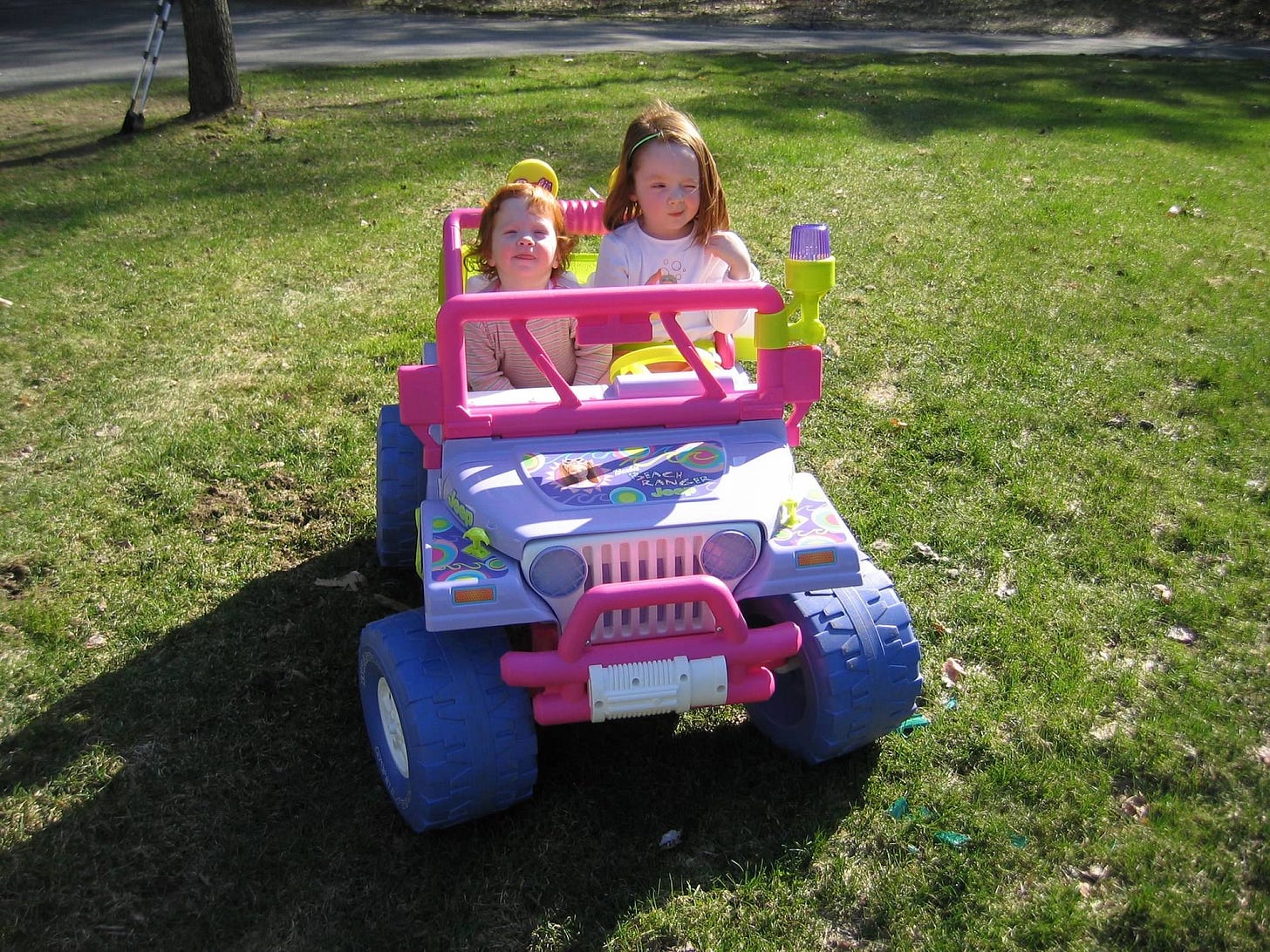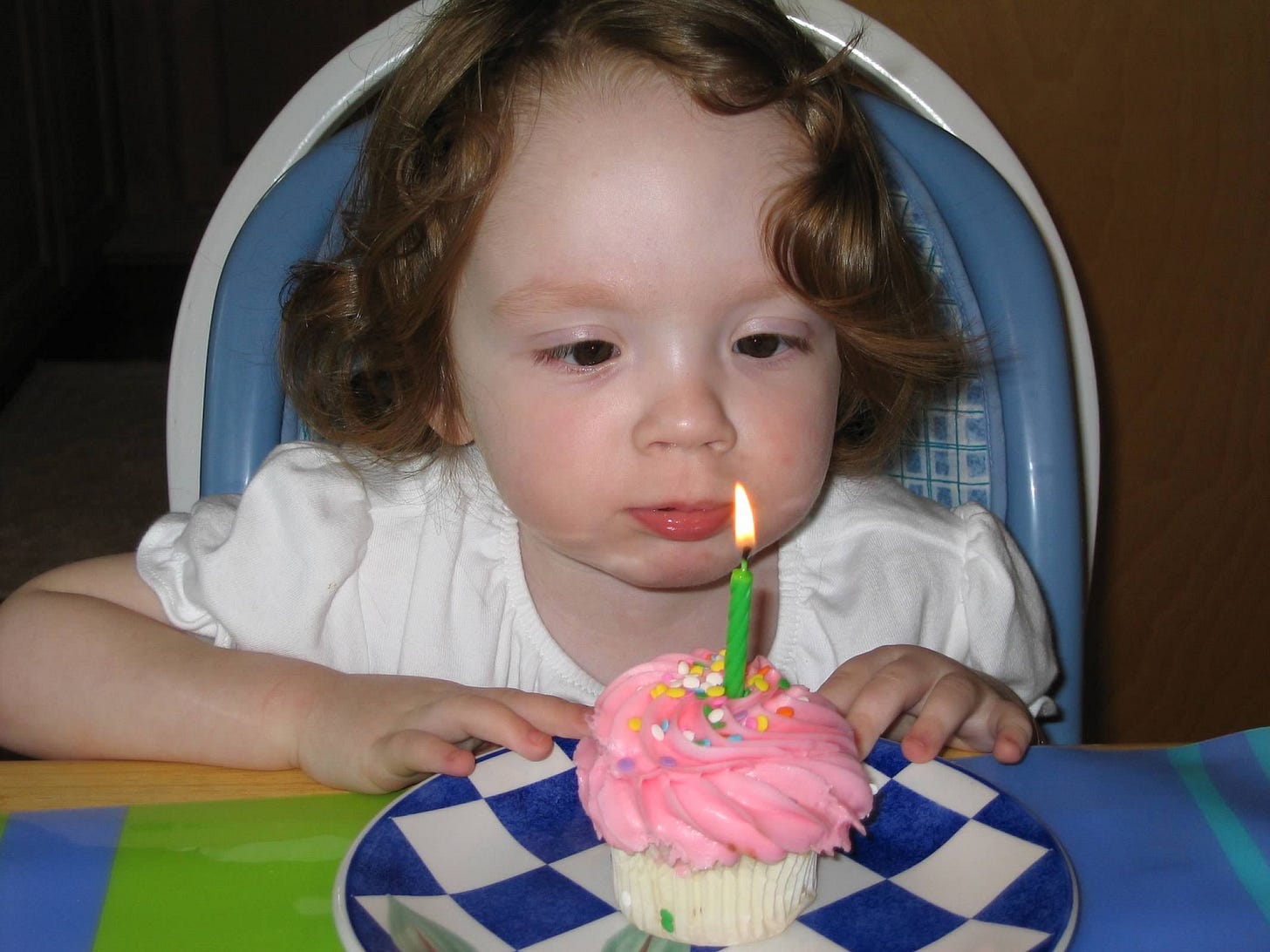Hi guys,
So, I watched Barbie. And it was awesome. Growing up, I was a massive Barbie girl, as they say, but I was a princess/fairy/mermaid Barbie girl, so I’ll admit I was a bit skeptical of a live-action Barbie with no fairies nor princess and only one mermaid played by Dua Lipa. I also thought Ryan Gosling was too old to play Ken LOL only Barbie is powerful enough to flip the paradigm so that the male lead is age-shamed over the woman. Honestly, though, who was I kidding? Of course, I was going to love it. I had an independent study on girlhood last semester. This film was made to pick my brain and make me cry.
Before I watched the movie, I hadn’t really thought about what Barbie meant to me. I must’ve been in middle school when people started calling for Barbie to be more diverse or rather, it was then that I was old enough to understand and pay attention to the discourse. The first plus-sized Barbie came out in 2015 (my freshman year of high school), and since then, Mattel has released pretty much every Barbie imaginable. And good! As they should! The diversification of Barbie happened on my periphery, and that is because I am incredibly privileged as a white woman who somehow managed to survive the competitive dance and ballet world without developing body dysmorphia. I mean, I knew Barbie was tanner and blonder than I would ever be, but that didn’t bother me. And for that, I am lucky. When I was a girl, Barbie was never a threat. She was a friend. A creative partner. We played together.
Barbie fostered my imagination. I don’t think it’s a stretch to say that I wouldn’t be a writer if it weren’t for my time playing with dolls growing up. I saw an interview with Greta Gerwig where she said that she played with dolls for much longer than other girls. Probably because she was lucky to stay a child for that long but also because playing with Barbie was the first time she got to direct or act. I also played with dolls longer than most. This is partly because I had a younger sister who always wanted to play and partly because I, like Greta, was practicing for what I was meant to do when I grew up. In a world where arts funding is routinely cut in public schools and it’s rare to write anything more than an argumentative essay, Barbie allowed children’s imaginations to run wild.
That is why Barbie is important. Because in her world anything is possible. Yes, I resent the beauty standards that inspired her form, but I do not resent Barbie. I think that is an important distinction to make. When we are children, we love Barbie. When we are grown up, we hate Barbie. But the thing is, it’s not Barbie’s fault. It’s our world’s. Greta Gerwig’s film did a great job asking audiences to acknowledge that distinction.
[Warning I am about to go full English major on you and there will be spoilers…]
The Barbie movie uses the classic fall-from-grace trope that we see in the Bible with Eve. The trope is copied and pasted throughout your favorite literature and AP English classes. While men can fall from grace (see Hamlet), I would argue that it is a quintessentially female trope (SEE OPHELIA). Thanks to Eve and her apple, us women have a lot more on the line. To make up for the weight of the original sin riding on our backs, we must strive to be as pure and perfect as possible. This, of course, is impossible, as America Ferrera’s impassioned monologue astutely points out. Society demands that we be perfect in a million contradictory ways. While Barbie is picture-perfect in many of those ways, she is still overly sexualized. This inspires men to act predatorily toward her, and it makes Sasha and her friends hate her—the classic woman-hating-women trope. Despite her bodily perfection and lack of vagina, Barbie still cannot embody the perfect pure woman because our society objectifies her. She would have to be less threatening, more modest, have smaller breasts, wear less makeup, etc. But then, of course, she wouldn’t be as beautiful… I appreciated that the film did not dwell on the woman-hating-women trope and over-sexualization of Barbie’s body. Sasha’s mom, played by America Ferrera, quickly arrives on the scene and kills the societal stigma against Barbie by reminding us why we loved her in the first place: because we played with her and because she taught us to imagine.
Barbie without our patriarchal society is not threatening. In Barbieland, she is fun, stylish, and unabashedly girly. She is not self-conscious, and that’s not because Margot Robbie is beautiful like a real-life Barbie doll. It is because she has no reason to be self-conscious since she has never had a man look at her in a predatory way or had another woman be envious of her looks or self-confidence. In Barbieland, the Barbies happily support one another and their accomplishments (see the awards montage at the beginning of the movie). There is no competition because there is no patriarchy. Ryan Gosling’s Ken gets jealous of the other Kens, but his jealousy does not affect the Barbies. While in our world, unfortunately, a dumb man will often come between two women because he has knowingly led both of them on, that kind of conflict does not exist in Barbieland. Barbie in Barbieland is what she was to us when we were girls, before we learned all the reasons to resent her.
This is why after Barbie experiences the real world, she cannot return to Barbieland, to being a doll, to embodying the innocence of a young girl. After Eve eats the apple, she gains knowledge, and knowledge never truly leaves you. The first English class I took at Kenyon was called Seductions, and one of the first books we read in that class was Paradise Lost.
That class was about as mojo dojo casa house as any of my Kenyon English classrooms got. For every three male students, there was one female. Sofia, Ione, and myself. What does it say about guys that they all flocked to a class called Seductions? It was tough to sit there, reading Paradise Lost, feeling horrible for Eve. It wasn’t really her fault. Adam ate the fruit, too, and honestly, it was probably going to happen one way or another because that serpent was damn persuasive, and I bet that fruit looked really delicious. So beach off. It wasn’t Eve’s fault, and Adam didn’t have to listen to her, but of course, he followed her like Ken follows Barbie because he was probably obsessed with her.
Luckily, Sergei (our awesome professor) proposed a more feminist reading of Eve. He explained that you could actually read Paradise Lost with some feminist empathy. When Eve fell, she was at rock bottom, but it is within the Christian belief system to argue that when someone is at rock bottom, they are closest to God. It is at rock bottom where they beg for forgiveness and are forgiven. When they are forgiven by God, they are reborn, in a sense, and therefore, better and more godly than they were before. The theory doesn’t completely absolve Eve from eating the apple, but it helps.
One of my favorite plays on this theory is the end of The Grapes of Wrath when Rose of Sharon, the single mother, feeds the dying man her breastmilk. It was our summer reading book the summer I moved to Michigan, and I remember everyone was so freaked out by the ending that our male teacher was like that was pretty weird, right? and proceeded to skip over it. But I was obsessed with it. I saw it as feminist, and hear me out. Rose of Sharon is pretty much worthless the entire journey. She never helps, and her number one trait is that she’s pregnant. Her baby is stillborn, too, so for a second, it seems like she’s pretty much worthless at being a woman—the one thing she had left to be good at. But then, all of a sudden, she’s the only one who can provide for life in the barren landscape of the Great Depression, and all because she’s a woman who accidentally got knocked up! The entire novel, Rose of Sharon is at female rock bottom—no longer a virgin, without a husband—but now, because she sinned, Rose of Sharon is the only one who can help. Everyone thought I was crazy for arguing this, but it was probably a sign that I was meant to be an English major at Kenyon College and not in Forest Hills Central’s sophomore Honors English class.
That scene is weird because it is weird to imagine Rose of Sharon nursing a grown man, but more than that, we are inclined to write off the scene because we are uncomfortable with motherhood and womanhood as a whole. No one wants to talk about how Rose of Sharon low-key saved the day because she did so by breastfeeding. Because it was her boobs that saved the day.
If the ending was talked about at all in my high school English class, it was the fact that her “lips came together and smiled mysteriously.” The focus on her lips and mysteriousness evokes her sensuality and distracts from the fact that Rose of Sharon is literally saving this man’s life. Similarly, we are so caught up in Barbie’s long legs and perfect breasts that we don’t realize how revolutionary she was. As the opening scene of Barbie demonstrates, girls played mainly with baby dolls before Barbie. Then, all of a sudden, they had a doll who could just be a woman. She could be a mother if the little girl playing with her wanted to be, but she could also be a princess, a doctor, a mermaid, and so on.
After Barbie’s fall from grace, she meets her creator, and they walk through a white vacuum heavenscape. Here, God is a woman, and she’s Ruth Handler, the creator of Barbie. It is revealed that Barbie is Ruth’s daughter, Barbara Handler. So basically, Barbie is Jesus, and like Jesus, she chooses to live among women on Earth rather than hang out with all the other Barbies in heaven aka Barbieland. It’s beautiful that even after experiencing patriarchy, Barbie chooses to become a woman in the real world. Because tbh, I think I’d love to move to Barbieland where there’s no such thing as a vaginal speculum. But in all seriousness, what a beautiful ending. I cried. I cried a lot.1 I cried when Barbie told the old woman that she was beautiful, and the woman said, “I know.” That’s the magic Barbie energy that we need in this world. No more Barbie resentment. Let us let her be beautiful because we are also beautiful. It doesn’t have to be a competition.
The little girl beside me was sitting in her mother’s lap wearing a pink princess dress, and she kept getting distracted during the scenes that made me cry the most (i.e. the America Ferrera monologue and the Barbie Ruth heaven exchange). I realized it was because she’s still too young to have felt the pain of being a woman. She came to see Barbie because she still sees her as a toy and a friend. I couldn’t help but think about how she’ll watch the movie a decade from now and sob. When I said that, my mom said, “Well, maybe she won’t have to.” Society may change, but I think being a woman will always be hard. No matter how much society changes we will still have to deal with getting our periods once a month. As my mom said in another conversation about becoming a woman, “You just get used to it.”
I’m nannying three girls this summer, and the oldest is 13. Boy, does my heart go out to her. Being a teen is so hard, and she knows it. She told her younger sister that she would do anything to be 10 again, and that broke my heart. I’m happy that she gets to watch Barbie and that I’ve introduced all of them to Taylor Swift. At first, the oldest was a little anti-Taylor, and I get it. I was anti-Taylor for a long time, too. Society teaches us to dislike her for the same reasons it teaches us to resent Barbie. Taylor Swift sums it up perfectly in her song “The Man.”
When society turns us against Barbie, it turns us against all the things that made us girls. Our love for pink. Our ambition. Our confidence. Our natural beauty. Our imagination. I wonder how I would have felt if I had been able to watch Barbie when I was 13. I wonder if I would have gone into the basement and pulled out my dolls and let myself play one more time. My answer to “What’s your favorite color?” used to be “pink and green,” but somewhere along the line, I changed it to just “green.” Maybe I would have started to say pink again. It’s tempting to imagine that seeing the movie could have saved me from experiencing the pain of girlhood and inspired me to embrace my inner child sooner.
But it’s never too late. This summer has been the summer of embracing that little girl. Here I am sharing my writing on a weekly basis. I didn’t even realize that I stayed up until 1 am writing this essay. I was having so much fun and in such a flow state that I didn’t look at the clock. I can’t remember the last time I wrote like that.
I spend two days a week with my nanny girls. I play with them and color like I used to. We analyze Taylor Swift’s discography in the car. The last time I saw them, I realized that the oldest had memorized a ton of her songs and had a whole theory about the lyrics to “Message in a Bottle,” which leads me to believe she has been listening to Taylor when I’m not there. The other day, we had a picnic in the park, and she spent the whole afternoon building a fairy house with her sisters. How wonderful to know that if I have done anything this summer, I have helped preserve her girlhood. 13 is hard, but she’ll get through it. All of them will. Because we have to. Unlike Barbie, we don’t get a choice. That’s why I loved the ending. Barbie chose the gynecologist over living in the matriarchal utopia that is Barbieland. It shows girls and women that even though there is patriarchy, being here to share your beauty and talents with this world is worth it.
Here are my songs for the week:
Obviously, I am including Billie Eilish’s song that she wrote for the movie. In an interview, Greta Gerwig said that she asked Billie to write “Barbie’s heart song.” And I’m sobbing because it’s perfect. Billie was definitely the perfect girl to write the song. Patriarchy has really put her through it, and I can only hope that it gets better for her and for the rest of us.
I’m putting “Would’ve, Could’ve, Should’ve” on here because of the lyric “Give me back my girlhood it was mine first.” Every time I hear it, it hits me right where it hurts. Most people think the song is about John Mayer. I’m glad that Taylor is still getting her revenge and also weirdly comforted by the fact that although she is incredibly successful, has been through lots of therapy, and treats her younger self with grace and forgiveness, she still has regrets. If Barbie has to get pap smears, then Taylor Swift can still be haunted by that one boyfriend who screwed her over, and you can, too.
I’m including “Little Joys” by Maggie Rogers because I just love the lyrics. Barbie and Maggie are probably friends in the real world, and I bet Barbie listens to this song when she’s having a moment because it’s hard to be a real girl in the real world… but I guess at the same time you could say it’s “a big mess of little joys.” ;)
This one goes out to my girl Kylie Jenner who said that she regrets her plastic surgery because her daughter has the features she used to feel insecure about, but when she looks at her daughter, she sees no imperfections, only beauty. This song is going to fuck you up. Lucy Dacus leaves no survivors. This song is like “What Was I Made For…” but worse because it’s not just about you. It’s about your mom, too.
I have to put another Lucy Dacus song on the playlist because her last album was literally all about girlhood. She gets it. Like, really gets it. Go for a nice drive or take a long bath and listen to all of Home Video. I had the pleasure of seeing her perform that album live, and she’s just the best. Also, not all of the songs are that sad… there are a couple of bangers…
Find the pony,
Maddie
P.S. What was your favorite Barbie movie? Mine was Barbie and the Twelve Dancing Princesses. I had a massive crush on the cobbler Ken love interest.

P.P.S. Every girl had exactly one Ken doll (if she had any), who was yours? Mine was the Ken from Barbie Swan Lake.
Bonus: A random website has preserved the games I used to be obsessed with playing at www.barbie.com. As a kid, to remember how to spell “Barbie,” I would sing the “B-A-R-B-I-E, Barbie girl” jingle in my head.
https://www.numuki.com/game/barbie-odette-dress-up/
https://www.numuki.com/game/snip-n-style-salon/

It should be noted that I cried the most during the Depression Barbie commercial. Not sad tears, but almost happy tears. There was something so great about seeing myself and my imperfect emotions displayed on the screen. Tonally, the commercial was a joke, but I always say that humor is used to mask the things that won’t be taken seriously if we say them truthfully. All the media responses to Barbie and the Eras Tour are that there is obviously a huge gap in media produced for women. There is a reason why romance novels and middle-aged women keep the publishing industry alive. We are starved for representation, and in romance novels, we often get a relatable, strong female lead, and a man who is just Kenough. We don’t usually get to see women be imperfect and upset and “ugly” in sweats and a t-shirt because most of our media is produced for the male gaze. Hearing the other women in the audience crack up when the BBC Pride and Prejudice joke was made was awesome. I felt seen, and women deserve to feel seen more often.











Hi Barbie! This is such a gorgeous letter to girlhood. So grateful for you hitting your flow-state and writing this for all of us.